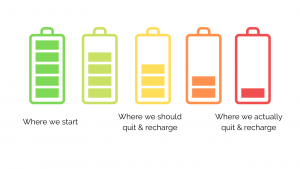How Exercise Decreases Fatigue
Fatigue and exercise are a vicious cycle. This cycle often occurs when you do too much in one day, become exhausted, rest for a week, and exercise again. And the cycle repeats. Fatigue can happen for many reasons, many of which are due to a chronic illness. I understand that saying “you should just exercise more” to a person with chronic illness, and chronic fatigue is ableist, and I am not trying to preach that narrative. I will do my absolute best to explain how to exercise to prevent fatigue instead of triggering fatigue.


 To decrease this fatigue overall, we need to strengthen your whole system. Taking time out of your day, every day, to schedule in simple strengthening exercises will build your battery so you will be able to be active longer without needing to stop due to fatigue.
To decrease this fatigue overall, we need to strengthen your whole system. Taking time out of your day, every day, to schedule in simple strengthening exercises will build your battery so you will be able to be active longer without needing to stop due to fatigue.
What is Fatigue?
Fatigue is not being tired; it’s an entirely different feeling based on proper exhaustion. It is not because you haven’t slept enough, and no amount of coffee will make it better. Tired happens to everyone; we are tired after a hard workout, tired at the end of the day, and tired when we don’t sleep enough. Tired is not fatigue. Fatigue is a constant and unrelenting form of exhaustion. Fatigue happens when our bodies cannot provide enough energy to function properly, let alone do our normal daily activities. This will ultimately lead to needing more rest than an average person and doing less movement overall. Our bodies love to move – we are meant to. But, if you can’t move as much as necessary, it leads to deconditioning. Fatigue does not just come from being conditioned. Other chronic disorders, such as hypothyroidism/Hashimoto’s disease, chronic fatigue syndrome, myalgic encephalomyelitis, sleep apnea, POTS, kidney disease/organ failure, and other chronic illnesses can also be at the root cause of fatigue. However, most of these conditions, if there is too much rest involved, can lead to deconditioning, which is often the root of the issue.
What does Deconditioning Have to do With fatigue?
Deconditioning is a very complex physiological change in your body after a period of prolonged rest. This can happen as quickly as a week, but those losses are typically regained more easily. The deconditioning I am talking about occurs after months to years of not moving freely, walking, lifting, working out, or even consistently running errands. This will lead to a decrease in cardiovascular function, decreased muscle mass, and more. Decreased muscle mass is what we are going to focus on here. A decrease in muscle mass can increase the risk of infection, decrease muscle strength & mass, increase the risk for comorbidities, increase the risk of death, and more. However, it would seem impossible to work out, move, and increase muscle mass with chronic fatigue, right? Well, not exactly. Strengthening, in many cases, is a primary key here.How Strength Training Helps Fatigue
Fatigue stems from quite a few areas, as mentioned above. Still, for this article, we will talk about deconditioning as the source of fatigue, as deconditioning is a linchpin between all other conditions and fatigue. Your body can do a specific number of tasks each day, and your body needs the endurance to do all of those tasks. The strength of your muscles is a significant factor in fatigue. Your body needs to be strong enough cardiovascularly (heart and lungs) and musculoskeletally to provide your whole body the strength to get through a day with enough endurance not to run on empty and take energy from the next day by overdoing it. Strength training works to combat fatigue by increasing your endurance. In this case, we are talking about muscle endurance, and although the science can get much more complex, it’s not necessary to understand how to combat it. You run around all day doing the same thing over and over, wondering why you become tired after a while. Becoming stronger, and working intentionally to strengthen the systems that are fatiguing helps improve your endurance. This is true for anything. If you want to run a 5k race but can only run 1k right now, there’s no way you will run a 5k without training, right? If you want to do a bicep curl with 15 pounds, but can only like 5 pounds right now, no amount of living your life the same way will help you get to that 15-pound mark. This example can be said for anything, and it can be used to describe how strengthening your body will improve your ability to do your activities of daily living without extreme fatigue. You need to intentionally strengthen your system to be able to tolerate all of your activities. Muscular strengthening programs, like Vestibular Group Fit, does this exactly. In this group, there is an opportunity for 6 days/week of workouts, which will strengthen your entire body. But cutting out 30-45 minutes of your day, a few times a week, you will be able to improve your overall endurance to be able to do more than you were previously. Your muscles will become stronger, your cardiovascular strength will improve, and you will be able to do more longer!
Energy Conservation for Fatigue
Energy conservation is planned rest and scheduled activity, which is helpful with chronic fatigue and chronic dizziness. Energy conservation is always helpful, with or without a fatigue dysfunction, but especially if you are becoming exhausted from activities that you used to not have any issue with. Energy conservation is the process of changing the environment or the task in order for it to match your energy levels and expenditure. Tactics like delegation, time management, task grouping, and interval rest are important to effective energy conservation.Delegation
Asking for help where you need it is vital. People like to help, especially the people closest to us. Our loved ones are available to take on tasks when you don’t feel that you can. If you need extra groceries from the store, ask your partner to pick them up on the way home from work instead of making an extra trip out to get them. This helps conserve energy for when your whole family is home at the end of the day.Time management
Manage your time in a scheduled way so you’re able to place high-energy tasks further apart from each other. When you have your day planned ahead of you, even if plans change, it will be easier to know what you can say yes and no to. If you’re having a day where you’ve managed to take a lot of time for yourself, and dinner plans pop up you will be able to say yes. It’s all about planning for what you need to do during the day, and not overdoing it into the next day.Task Grouping
Grouping multiple tasks together that make sense together can be very helpful. Instead of making multiple trips out of the house daily, try making one trip for errands, but resting in between stores. You can take a break in your car or on a bench if you need, but you won’t have to drive both ways multiple times, saving you both time and energy.Task simplification
As humans, we tend to overcomplicate things that should be simple. Try to buy precut vegetables, use grocery delivery services, sit to cook/clean/shower, and streamline your chores. The easier that all of these tasks are, the easier it will be for you to do more throughout the day! Really reflect on what you do day to day and try to implement simplification in at least 50% of them.Interval Rest
Quit while you’re ahead. We tend to quit after we are running on empty and are feeling exhausted. In the photo below, the battery is slowly dying. Think of yourself like a battery that needs to be charged. Charging while you’re already partway charged is significantly more quickly than your phone’s battery dying and you needing to restart it. Rest before you absolutely need to charge. that means you may need a 15-minute nap or couch sit throughout the day. This is not something to be ashamed of; instead, be proud of yourself for listening to your body’s needs. To decrease this fatigue overall, we need to strengthen your whole system. Taking time out of your day, every day, to schedule in simple strengthening exercises will build your battery so you will be able to be active longer without needing to stop due to fatigue.
To decrease this fatigue overall, we need to strengthen your whole system. Taking time out of your day, every day, to schedule in simple strengthening exercises will build your battery so you will be able to be active longer without needing to stop due to fatigue. Vestibular Group Fit has a Premium Content Module about fatigue. You will learn about prevention, energy conservation, treatment. And, the best part, is it can be completed from the comfort of your own home.
Got to the end of this article? Awesome job! Let’s get you a few bonus points — DM me that you saw this message!


3 thoughts on “How Exercise Decreases Fatigue”
Really appreciate this explanation 👏
This is so informative…really speaks to me!!
So happy I’m able to help! 🙂